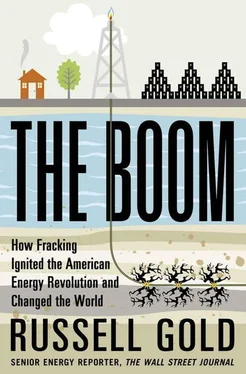Over the years, Texas and other state courts eased up. By the 1970s, the courts tilted back a bit toward landowners. Oil companies could only use what land was “reasonably necessary” and consistent with typical industry practices. Today’s courts and state regulators are considerably less tolerant of wanton disregard for landowners and the environment than they were in 1919. But the principle remained in place as shale development shifted into high gear in the first years of the twenty-first century. In legal terms, the landowner remains the servant while the mineral owner, and the companies that lease these rights, is the master.
This decidedly pro-drilling legal framework is one of the reasons fracking was an American invention. The right conditions existed in the United States to encourage oil and gas exploration and the risk taking necessary to propel the industry forward.
There are other reasons as well. From Saudi Arabia to Mexico, in Europe and Africa, oil and gas belong to the state. State-run energy companies, in many parts of the world, administer and exploit these national resources. The governments usually own all the oil and gas, even if they are under private property. The United States chose a different path. It has never had a national oil company. American colonists rejected English common law, which reserved all mineral rights for the monarch. Initially, landowners in the United States owned their minerals and this created an enormous incentive for them to allow oil and gas drilling, because any wealth went into their wallets. If someone other than the landowner held title to the subterranean riches and stood to reap all the profits without any disruptions, the incentive would be even greater. America’s private ownership of mineral rights, conceived while whale blubber, coal, and wood were still the fuels of choice, turned out to be remarkably useful in the petroleum age. It was “a marvelously elegant system that ensures that all natural resources are fully developed,” enthused Rex Tillerson, the chairman and chief executive of Exxon Mobil.
A permissive legal system, large financial incentives for the owners of mineral rights to allow drilling, and a tradition of small, independent energy companies struggling for survival and willing to take risks created an environment where fracking took root and flourished. From the dribble of gas in Mitchell Energy’s 1982 C. W. Slay well, it took twenty-six years for the fracking industry to reach an annual production of 1.84 trillion cubic feet of natural gas from shale. It took two years to double that to 3.68 trillion cubic feet. And it took less than two years to double that again to 7.36 trillion cubic feet.
Like it or not, fracking is here to stay. What began in Texas moved to neighboring states and then across the country. It is now spreading around the world. The sun never sets on a frack crew. Fed by a steady diet of fresh capital from investors, the drilling industry proceeded with abandon, not caution. This headlong rush created a glut of gas and reversed decades of declining oil production. This flush of fuel created new wealth, jobs, and economic opportunity. The phenomenal growth of fracking took everyone by surprise. The energy industry wasn’t prepared, and neither were landowners and government officials. While fracking upended the energy landscape in many ways that are beneficial, it also had its own set of problems. “This came much faster than anticipated,” said Peter Voser, the chief executive of Royal Dutch Shell, in an interview. “And neither the regulator, the legislator, nor the industry was actually prepared to deal with the issues.”
———
Today’s boomtowns bear only slight resemblance to Burkburnett nearly a century ago. There is still a rush of wealth and jobs, housing shortages, and often a surge in drug use. Landowners with mineral rights are generally ready and willing to sign large leasing bonus checks. Modern-day Ottis Grimeses, who live amid the trucks and diesel-powered compressors but don’t have a share of the prosperity, tend to be the loudest critics. John Tintera, who for twenty-two years worked at the Texas oil and gas regulator and retired in 2012 as executive director, said his biggest mistake was not to recognize the problem of surface owners who had all the nuisances without getting any compensation. In a speech in September 2013, he said he never heard from the people “getting money in their mailbox on a regular basis… the real complaints were from surface owners.” There will likely be more latter-day Ottis Grimeses who live with drilling but don’t get checks. Developers and sellers are increasingly holding on to the mineral rights, hoping that drilling may one day begin.
But there are many significant differences between Burkburnett and modern shale communities. Gone are the mile-long creeks of flowing oil. Reckless environmental degradation, at least in the United States, often results in fines and criminal convictions. Energy production near where people live has brought about more community involvement, accountability, and lawsuits. The industry is being scrutinized more closely than ever. States are playing catch-up, struggling to become fleet-footed regulators with the backbone to stand up to industry. Many remain conflicted, however, and want to make sure they don’t choke off the economic gains created by drilling.
Emily Krafjack is trying to find what she calls the “delicate balance” between the benefits and headaches of drilling. She lives with her husband in a rural home in Mehoopany, Pennsylvania. She leased her property, as did her neighbors. Chesapeake Energy chose to build a drilling pad on the edge of her neighbor’s property, which put it right on the edge of her small plot of land. It drilled the first well five hundred feet from her porch in 2010.
“It was a lot louder than we expected. Everyone told us we would hear a hum. I would have loved that. We heard every clang and bang and every worker yelling,” she said. She slept, or tried to, with the television on in a futile attempt to drown out the noise. Her husband, a construction worker, told her it was louder than a pile driver. Once, a convoy of trucks filled with sand backed up in front of her home, filling it with diesel fumes. “I thought I could grin and bear it, but I was coughing my head off,” she said.
Unlike Grimes, she didn’t sue. She appreciated the jobs the companies brought into her community. “I have friends and family who got jobs. Many of us have benefited from bonus payments and royalties. It can be very good for our local economy,” she said. (Her observation is borne out by national statistics. Between 2010 and 2012, the United States added 169,000 fossil fuel–related jobs, a pace ten times quicker than the rest of the economy.)
Krafjack educated herself about drilling and created a nonprofit organization to spread information about how to hold the industry to the highest possible standards. She learned that some companies built sound barriers around their drill pads to muffle the noise, and insisted Chesapeake build one. It did for the second well. “I don’t think I’m being unreasonable. I can’t talk on the phone or watch my television when they are fracking,” she said. When she called Chesapeake and complained about the trucks, they were gone within an hour. “There are times when the delicate balance is reached. When an operator or a pipeline company decides to do something better, they are working towards the balance,” she said.
Mark Boling, a top executive with Southwestern Energy, a Houston driller, agreed there is more work to do. “The industry has done a great job of figuring out how to crack the code belowground—how do you get natural gas or oil out,” he said. “However, it hasn’t spent a lot of effort thinking about how you handle development aboveground.”
Читать дальше












